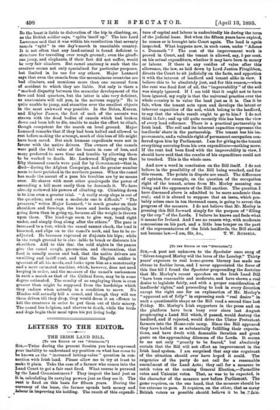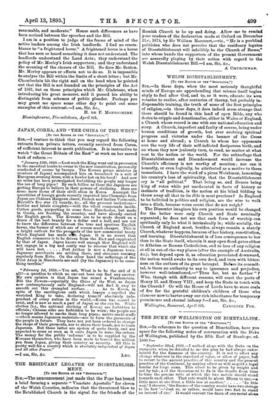[To THZ EDITOR OF Tax " SPECTATOR:1 SIR,—A poet not
unknown to the Spectator once sung of " Silver-tongued Morley wid the lures of the Loreley." Thirty years' exposure to real home-grown blarney has made me obtuse to feebler lures, and I never appreciated the force of this line till I found the Spectator propounding the doctrine that Mr. Morley's recent speeches on the Irish Land Bill "have been reasonable and moderate, and have shown a real desire to legislate fairly, and with a proper consideration of landlords' rights," and proceeding to look in every direction except the right one for an explanation of Mr. Morley's. "apparent act of folly" in expressing such "real desire" in such a questionable shape as the Bill read a second time last Friday. Mr. Morley's Irish supporters in the press and on the platform have been busy ever since last August prophesying a Land Bill which, if passed, would destroy the landlord, and if rejected, would drive the Ulster Protestant farmers into the Home-rule camp. Since the Bill appeared they have hailed it as substantially fulfilling their expecta- tions, and have dwelt with damnable iteration and great gusto on the approaching dilemma of the Lords. It seems to me not only "greatly to be feared," but absolutely certain that the Bill will not effect an improvement in the Irish land system. I am surprised that any one cognisant of the situation should ever have hoped it could. The exigencies of the party do not call for a reasonable amendment of the Land Acts; they call for a measure to catch votes at the coming General Election,—Parnellite votes and Unionist votes. That, as was to be expected, is the character of the measure now before Parliament The game requires, on the one hand, that the measure should be too extreme to pass. It requires, on the other, that as many British voters as possible should believe it to be ,`! fair-
reasonable, and moderate." Hence such differences as have been noticed between the speeches and the Bill.
I am in a position to judge of the frame of mind of the active leaders among the Irish landlords. I find no resem- blance to "a frightened horse." A frightened horse is a horse that has seen or heard something it does not understand. The landlords understand the Land Acts ; they understand the policy of Mr. Morley's Irish supporters; and they understand the meaning of the clauses of the Bill. So does Mr. Sexton. Mr. Morley appears or affects not to do so. It is impossible to analyse the Bill within the limits of a short letter; but Mr. Chamberlain hit the right nail on the head when he pointed out that the Bill is not founded on the principles of the Act of 1881, but on those principles which Mr. Gladstone, when introducing his great measure, said it passed his ability to distinguish from schemes of public plunder. Perhaps you may grant me space some other day to point out some examples of this contrast —I am, Sir, &c.,



































 Previous page
Previous page